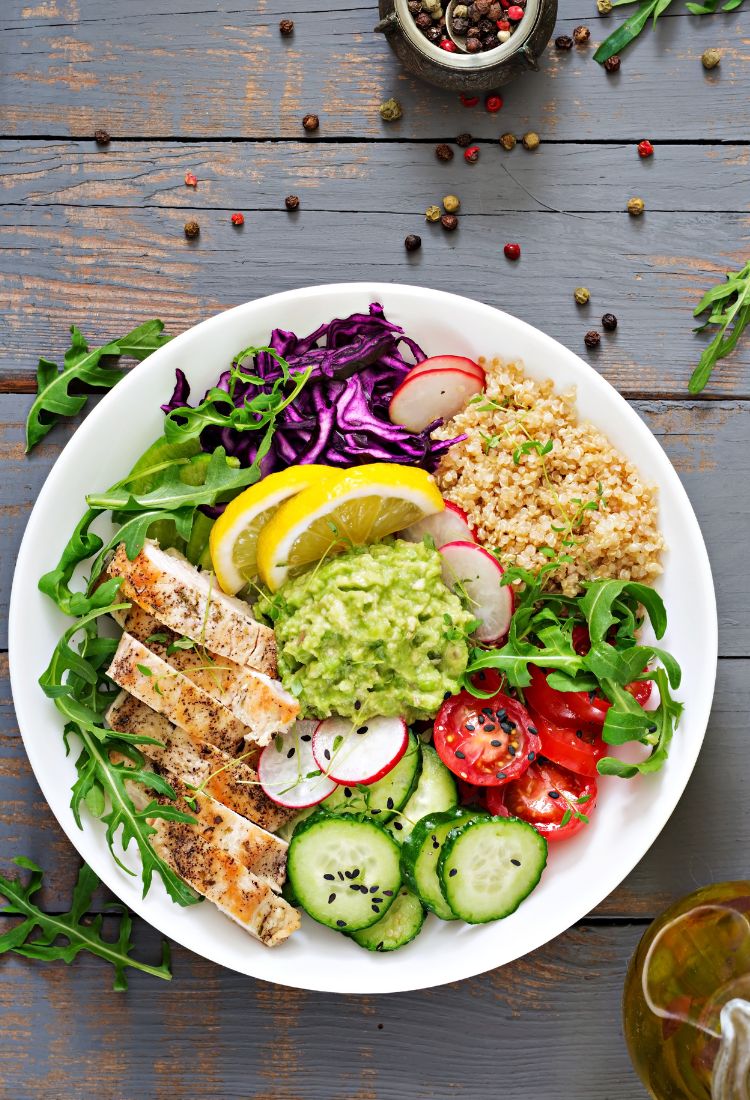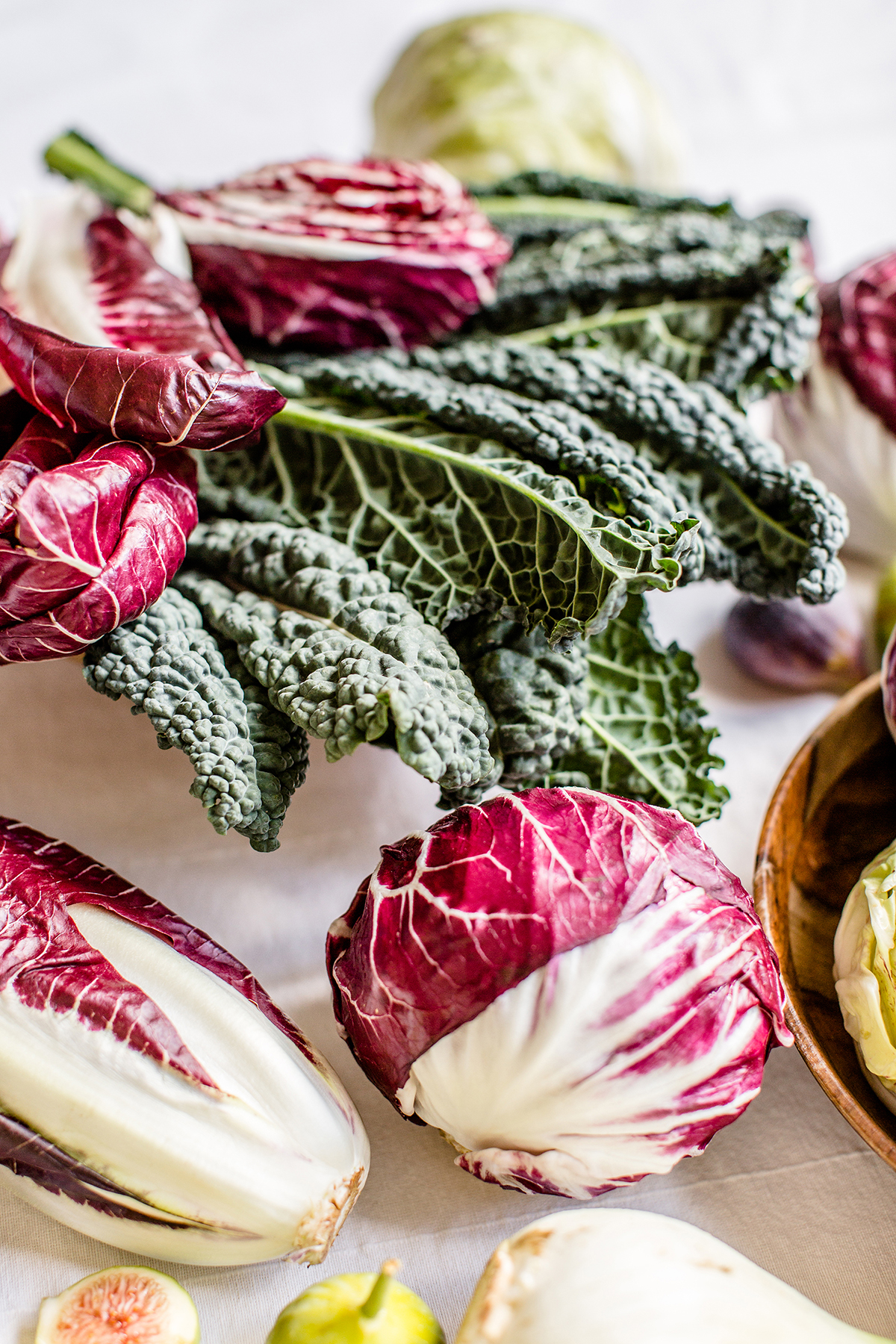Mediterranean Diet Foods List | Elizabeth Rider



Looking for a list of foods in the Mediterranean diet? I’ve got you covered!
I like to think of this way of eating as Mediterranean-Style as opposed to a “diet” because the list of foods on the Mediterranean diet are abundant and the meals are flexible.
The Mediterranean diet style of eating is a traditional way of eating that is based on the food consumed by people living in countries bordering the Mediterranean Sea, including Greece, Italy, and Spain.
The diet is characterized by a high intake of whole, plant-based foods such as fruits, vegetables, legumes, nuts, and whole grains, as well as olive oil as the primary source of dietary fat.
The Mediterranean diet also includes moderate consumption of fish, poultry, and dairy products such as high-quality cheeses and yogurts. Red meat, sweets, and processed foods are limited in the diet but not completely off-limits.

Research has linked the list of foods in the Mediterranean diet recipes to numerous health benefits, including a reduced risk of heart disease, stroke, diabetes, and some cancers. The diet is also associated with better weight management, improved brain function, and a longer lifespan.
The 80/20 Lifestyle & The Mediterranean Diet
As I discuss in my book, The Health Habit: 7 Easy Steps to Reach Your Goals and Dramatically Improve Your Life, the 80/20 lifestyle is a great way to think about moderation is the 80/20 lifestyle, where 80% of the food you consume falls into the whole plant-based foods category, and the other 20% can consist of meats, sweets, bread, and other “treats.” This allows you flexibility in everyday life.
Read more about the 80/20 lifestyle here >
Mediterranean Diet Foods List
There are many whole foods available to us on planet Earth. Here are a few of the most common foods in the Mediterranean diet style of eating:
- Fruits: apples, oranges, bananas, grapes, berries, peaches, pears, citrus fruits, etc.
- Leafy greens: spinach, kale, romaine, and other types of lettuce
- Vegetables: tomatoes, peppers, cucumbers, carrots, onions, garlic, etc.
- Legumes: chickpeas, lentils, beans, peas, etc.
- Nuts and seeds: almonds, walnuts, cashews, pistachios, pumpkin seeds, pine nuts, sesame seeds, etc.
- Whole grains: whole rolled or steel-cut oats, barley, quinoa, whole-grain bread, wild rice, and some pasta
- Fish and seafood: white fish, salmon, sardines, tuna, shrimp, mussels, etc.
- Poultry: chicken, turkey, duck
- Minimally-processed dairy products: natural cheeses, no-sugar-added yogurt, and some minimally processed milk and cream. Real Parmigiano-Reggiano cheese is famous for its health benefits and fits well into the Mediterranean diet
- Olive oil: extra virgin olive oil is used as the primary source of fat in cooking in the Mediterranean and as the base for homemade dressing for salads
- Herbs and spices: basil, oregano, thyme, rosemary, parsley, cinnamon, cumin, black pepper, red pepper, etc. Herbs and spices are full of flavor and high in antioxidants and plant nutrients. Small amounts of Kosher salt and sea salts are also added to Mediterranean foods to enhance flavor
- In moderation: some additional foods that are occasionally consumed in the Mediterranean diet include eggs, high-quality red meat (in smaller quantities), and wine (in moderation, and not required to be healthy if people prefer not to consume it)
While some foods like avocadoes and quinoa are not native to the Mediterranean, they are still widely adopted in this style of eating.
Find my favorite Mediterranean diet recipes here >
The bottom line: The Mediterranean diet is a flexible style of eating that emphasizes whole, minimally processed foods, and encourages a balanced intake of different types of foods. It is considered a healthy and sustainable eating pattern that can be adopted by people of all ages and backgrounds.

Benefits of The Mediterranean Diet
The Mediterranean diet is recommended for several reasons, including its potential health benefits and its emphasis on whole, minimally processed foods. Here are some of the reasons why the Mediterranean diet is considered a healthy and sustainable eating pattern:
- Heart health: The Mediterranean diet is rich in healthy fats, fiber, and antioxidants, which have been linked to a reduced risk of heart disease and stroke.
- Weight management: The diet is high in fiber, which can help you feel full and satisfied, leading to better weight management.
- Brain health: The Mediterranean diet may improve brain function and lower the risk of cognitive decline and Alzheimer’s disease.
- Cancer prevention: The diet’s emphasis on plant-based foods, healthy fats, and antioxidants may help prevent certain types of cancer.
- Sustainability: The Mediterranean diet emphasizes whole, locally sourced foods, which can be more sustainable and environmentally friendly than processed and packaged foods.
- Cultural heritage: The Mediterranean diet is a traditional eating pattern that has been passed down for generations and is a way to connect with cultural heritage.
- Food enjoyment & social connection: The list of foods in The Mediterranean diet includes flavorful and delicious foods that many people enjoy eating. Plus, there are numerous health benefits to enjoying meals with friends and family.
The bottom line: The Mediterranean style of eating has many health benefits.

The Mediterranean Diet and Social Connection
It’s common in the Mediterranean culture to enjoy meals with friends and family in social settings. Here are some of the benefits of enjoying social connection while eating:
- Improves digestion: When we eat in a relaxed and social environment, our bodies are better able to digest and absorb nutrients from our food.
- Reduces stress: Eating with others can reduce stress and promote feelings of relaxation, which can improve digestion and overall health.
- Enhances mood: Social connections while eating can boost our mood and reduce feelings of loneliness and isolation.
- Encourages healthy eating: Eating with others can encourage us to make healthier food choices and adopt better eating habits.
- Builds relationships: Sharing meals with others can strengthen relationships and build a sense of community, which is essential for overall well-being.
- Promotes cultural awareness: Eating with others from different cultural backgrounds can expose us to new foods and traditions and promote cultural awareness and understanding.
The bottom line: Enjoying Mediterranean-style meals with friends and family is good for your health.
Get Mediterranean diet recipes here >
Overall, the Mediterranean diet is recommended for its health benefits, emphasis on whole foods, and sustainability. It is a flexible and enjoyable way to eat that can be easily adapted to different cultural preferences and dietary needs. The diet is rich in fiber, healthy fats, and antioxidants, which are all essential for maintaining good health.




